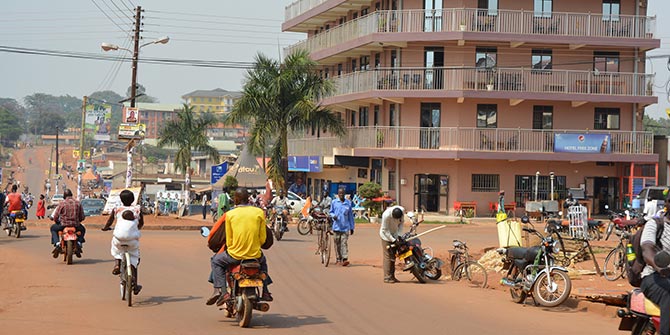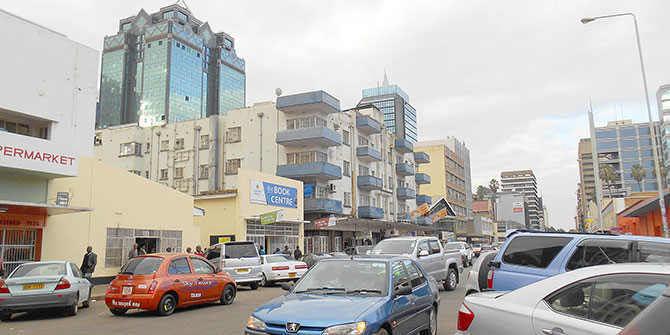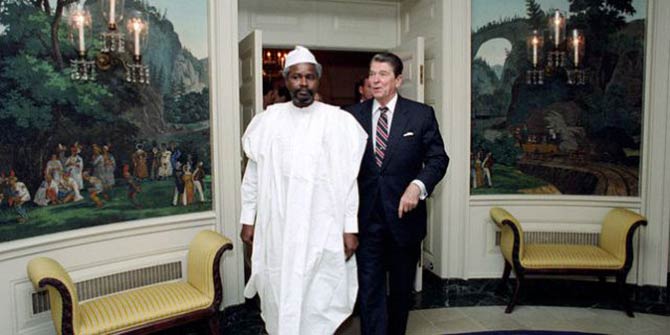The Uber revolution has arrived. The ride-share app launched services in South Africa, Kenya, Egypt, and more recently in Uganda and Ghana. One of the biggest potential benefits of Uber in African cities could be to provide urban planners and authorities grappling with how to manage rapid urbanisation with access to data. The app collects substantial data on ride times, routes, and estimates of the supply and demand for paid transport. Astrid Haas and Julia Bird of the IGC discuss.
The arrival of Uber in cities around the world has not always been a welcome development. Newspaper headlines over the past year have included images of car burnings in Nairobi, protests in Jakarta, and police firing tear gas on protesters in Cairo.
From a distance it may seem that Uber is stoking unrest in cities, working beyond the control of authorities with little in the way of advantages for urban residents.
Uber is a service that uses technology to empower any owner of a vehicle to take part in commercial ride-sharing ventures. It has revolutionised the transport industry in many European and US cities and created jobs, as one simply needs a car and a smartphone to register. Customers can easily order the service via a smartphone app. Therefore, in many places, it has provided cheaper and more reliable transport than the traditional taxis.
And now, Uber is taking on its next challenge: Entering the African market. It has launched in Cairo, Accra, Cape Town and Nairobi.

Photo Credit: Noeltock via Flicker (http://bit.ly/2cAxnYS)
In Uber’s newest and 462nd city, Kampala, two aspects of the service distinguish it from existing transport services. The first is the route. Passengers can directly follow, via the app, the direction their Uber is coming from and which direction it is taking them. Neither is necessarily the most direct route since, in a city like Kampala, the most direct routes are not usually the fastest, due to congestion.
Traffic congestion in Kampala imposes a substantial economic and social toll on the city. Earlier this year, at an urbanisation conference hosted by the International Growth Centre, the executive director of the Kampala Capital City Authority, Jennifer Musisi estimated that 24,000 man-hours are lost daily in traffic jams.
The second aspect is the price. Uber could gain significant comparative advantage in a market with both regulated and unregulated transport modes. Focusing on the noise created by taxi drivers who may be losing out to the new competition risks ignoring the many potential benefits of Uber’s presence.
In terms of regulation, connectivity and data, services of its kind could promote significant changes to the way urban mobility is understood and managed in African cities.
User-based self-regulation
Uber has sparked controversy in many cities due to concerns of regulation as well as how the service can be taxed. The potential costs in this respect for cities in developing countries are most likely to be smaller due to the fact that, in general, it is more difficult to effectively regulate private taxi operators. Services like Uber could provide mechanisms for user-based self-regulation in the areas of pricing and safety.
In cities like Kampala and Nairobi, the price of a taxi trip is usually determined ex-ante and is the result of a combination of factors, including the bargaining power between the driver and passenger, the type of car as well as the weather. Even in cities with decent competition between private providers, there are still variations in the price of a trip to the same destination.
With Uber, pricing is becoming standardised and increasingly transparent with the introduction of meters. The ultimate effect of this is that on the one hand, the price of a ride may be cheaper with a standardised fare, and on the other, congestion and time of day could result in higher prices. But the use of a meter has other regulatory benefits, such as the fact that governments may now have the opportunity to tax taxi drivers.
In terms of safety, lax or lacking regulation means that often any person can operate a taxi, regardless of the state of their vehicle or whether they have a valid driving licence. Uber ensures that cars operating as taxis are registered and thus clearly documented.
Furthermore, the reviews of the car and driver provided by passengers at the end of each trip allows for more effective and continuously updated user-driven regulation. The GPS tracking of the vehicles provide additional safety measures.
In countries where the overarching legislative framework is non-existent, Uber may have a first-mover advantage and thus a unique position to shape future legislation of ride-sharing services. For example, in Ghana, Uber has entered into a statement of understanding with the Ministry of Transport, which could later drive the drafting of other legislation in this area.
Connectivity is key to achieving density in a well-functioning city. Density allows firms to access large labour markets and facilitates better matching between firms and workers.
A city can achieve actual density when tall buildings are physically located near each other. However, it can also achieve it by ensuring transport systems link firms and households.
Cities like Kampala and Nairobi struggle with connectivity for a number of reasons: They have not achieved actual density. Instead, they are characterised by growing urban sprawl. They struggle with effective density and public transport options are limited.
The 2010 Uganda National Household Survey estimates that over 70 per cent of Kampala residents walk to work. This means, unlike a city like London where, in 2012 some residents could reach over 2.5 million jobs in 45 minutes, the number of jobs accessible within a similar radius is very low.
As the economy and the middle class grow, more vehicles are coming into the country. Yet the road network cannot keep up, which leads to increasing congestion. Uber could help mitigate this connectivity challenge by providing better transportation.
Uber may also help reduce congestion. By having up-to-date traffic information via smartphone apps and from other cars en route, Uber drivers are able to avoid congested routes. Their pricing structure, which includes surge pricing during peak time, may also discourage movement when routes are gridlocked. In the medium run, it could encourage ride sharing, as the newly launched uberPOOL has shown in some cities.
Data
There are other benefits that Uber can have for African cities, including employment creation or, as is currently the case in Kenya, providing information on drivers that can allow them to take out loans.
But one of the most important benefits Uber will bring to urban planners and other authorities grappling with managing rapid urbanisation is data. Uber has access to a large source of data, as the app collects information on ride times, routes and estimates of the supply and demand for their taxis.
This information, if made available, could greatly assist urban planners and researchers in understanding connectivity and how this ultimately affects firm productivity and liveability in cities.
As Uber’s reach grows, researchers and policy makers should be watching and engaging closely. As the case of Nairobi shows, the success of Uber has resulted in the launch of competing services. This is expected to spur performance and lower prices.
A version of this blog originally appeared in the East African, see the original here.
Astrid Haas is a IGC Country Economist, working in the Uganda and South Sudan programmes.
Julia Bird is a Postdoctoral Research Economist at Oxford University. She completed a PhD focusing on infrastructure and the spatial development of Brazil, at Toulouse School of Economics. Follow her on Twitter @juliahbird.
The views expressed in this post are those of the authors and in no way reflect those of the Africa at LSE blog or the London School of Economics and Political Science.





